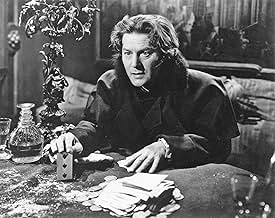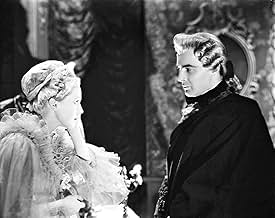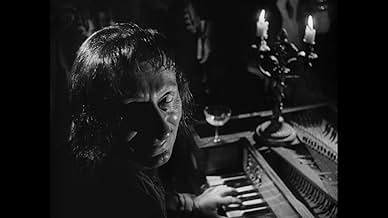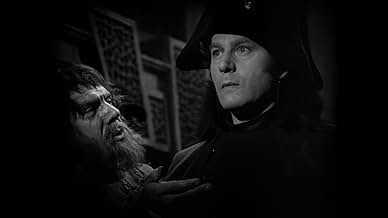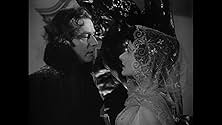Añade un argumento en tu idiomaAn army officer becomes obsessed with learning the secret to a card game for which an elderly countess sold her soul years earlier.An army officer becomes obsessed with learning the secret to a card game for which an elderly countess sold her soul years earlier.An army officer becomes obsessed with learning the secret to a card game for which an elderly countess sold her soul years earlier.
- Dirección
- Guión
- Reparto principal
- Nominado a 1 premio BAFTA
- 3 nominaciones en total
- Countess's Lover
- (as Yusef Ramart)
Reseñas destacadas
Anton Walbrook may have played more multi-dimensional characters in other films, but never with the same frightening intensity as in this one. The cast is uniformly excellent, but it's his performance as Hermann that really makes the film memorable. Hermann is a strange sort of cinematic hero with no redeeming characteristics whatsoever. His personality is dominated by four of the seven deadly sins: pride, envy, wrath, and greed. As for lust, he lusts only for power, money and influence, his declarations of love being completely false. Gluttony is not an issue, as he lives in poverty in order to horde what money he has. As for sloth, he exerts extraordinary effort into fulfilling his schemes, which are entirely self-serving. Sounds like a thoroughly unpleasant fellow. But Walbrook makes this brooding, scheming, petty, and utterly reprehensible nonentity with a Napoleon complex into a fascinating character study -- a real tour-de-force. The Vienna-born Walbrook (originally named Adolph Anton Wilhelm Wohlbrueck) exaggerates his Teutonic accent to Peter Lorre-like intensity, to great effect. It's this film that made him one of my all time favorite actors.
The look of this film is also extraordinary. Even in this pristine presentation, the cinematography is very dark and deeply shadowed. The shadowy look of the film, along with some oddly angular or distorted shots, is suggestive of expressionist style. The story is told very directly and the plot moved along efficiently, with no superfluous action, which adds to the unreal atmosphere of the piece. Everything associated with the story seems to take place in quick succession. In a city as huge as St. Petersburg, Hermann wanders from the spooky booksellers' shop directly to the old countess's house purely by chance. Every element of the story is essential, and executed with maximum effect and style. The funeral scene in particular is unforgettable.
What a pleasure to find that this terrific, but relatively obscure, film has finally gotten a DVD release, and looks better than I've ever seen it looking. Almost everyone who's commented on it cites the fact that it is little known, and maybe this new DVD will change that a bit.
I was fortunate enough to see it on cable, where by coincidence it was shown right after 'The Third Man' and just before another Brtish b/w masterpiece, 'The Haunting' -- what a triple bill! In fact there are several connections between QOS and 'The Haunting', including Jack Clayton, who produced the former and directed the latter, and composer Georges Auric, who scored both. There are also close connections with The Archers (Powell & Pressberger) -- Anton Walbrook featured in three P&P films, and co-writer Rodney Ackland also scripted one of those films, P&P's '49th Parallel'.
Watching 'Queen Of Spades' it's obvious that many of the team who made it learned their craft in the silent era -- lighting, costumes, set design and cinematography are all fantastic, and though on a slightly smaller and more restrained scale, QOS is almost on a par with Von Sternberg's baroque masterpiece 'The Scarlett Empress'.
Brilliantly directed by Torold Dickinson (who also did 'Gaslight', in which Walbrook also features), the incredible, wildly expressionistic b/w cinematography is by legendary Czech-born DOP Otto Heller, who began his career in 1922(!) and who also shot Olivier's 'Richard III', 'The Ladykillers', Powell's 'Peeping Tom' and those three classic Michael Caine films of the 60s, The 'Ipcress File', 'Alfie' and 'Funeral In Berlin.'
The casting is perfect, and it's easy to see why Anton Walbrook was one of Michael Powell's favourite actors. His portrayal of the odious Suvorin is a tour de force, and he is matched by the great Edith Evans as the Countess. The crucial scene in which Suvorin tries unsuccessfully to beg, cajole, and finally force the secret of the cards from the Countess is truly electrifying -- Walbrook is absolutely rivetting, and Evans -- who has no lines and plays the scene only with her eyes -- shows why she was considered one the greatest actors of her generation. The climax of that scene, the look of stark horror on Walbrook's face, is one of the most powerful film moments I've ever seen, perhaps only surpassed by incredible card-game scene at the end of the film.
Relatively poor Captain in the Royal Engineers jealous of the wealthy Cavalry officers around him dreams of making his fortune at faro, and eventually gets his way at the price of his precious soul. How he does it is a spooky tale involving an ancient irritating Countess played by the perfect Edith Evans and his attempt to get her to acquiesce to his demands. Who can forget the funeral scene when Walbrook is wondering how the dead can give up their secrets! Everyone acted their hearts out, Ronald Howard nicely restrained to Walbrook's occasional lapses into melodrama. Auric's music is spot on and as graceful as ever, we even get a preview of Orpheus in here to which he composed the music for the following year. The game of faro as depicted here always struck me as particularly boring, but I suppose it was as good a way as any for someone to lose money fast. The secret of winning money at cards is not to play for money at all and to keep your money. I simply can't understand why anyone would watch this for the full 90 minutes hating almost every minute and then waste more of their time telling us!
An utterly marvellous film, a UK post-War Wonder which will survive all comments positive and negative.
¿Sabías que...?
- CuriosidadesThe studio was right beside a train line and very badly sound-proofed. They had to post a man on the studio roof to watch out for trains so filming could be suspended while the trains went past.
- Citas
Capt. Herman Suvorin: [he surprises the Old Countess] Don't cry out! Don't be alarmed, please, don't be alarmed. I don't mean you any harm. I've come to ask a favour of you. That's all. A favour. It'll cost you nothing. But to me, it will bring happiness for the rest of my life. I want the secret of the cards. That's all. Come, what is it? The three cards. The names of the three cards. Please! Oh, it's no use pretending you don't know anything about it. I know you were given the secret. And I know who gave it to you. Please! Just think those three words aloud. And I'll trouble you no more. I'll go. What good is the secret to you? For whom are you keeping it? For your grandson? He's rich enough. What would another fortune mean to him, a wastrel and a spendthrift? But I'm not a man of that sort. I know the value of money. I could do great things, I tell you. Great things! If only I had money.
Capt. Herman Suvorin: [sinking to his knees, he continues] For the love of God! If you've any human feeling in your breast, you can't refuse me. I beg. I beseech you. I know why you won't speak. The secret is connected with some terrible sin. That's it, isn't it? I'll make a bargain with you; tell me your secret and I'll take your sin upon my soul. Do you hear me? I mean it. A bargain. I'll take your sin upon my own soul. Oh, speak! Speak to me! You old sphinx.
Capt. Herman Suvorin: [he brandishes a pistol and continues] By God, I'll make you. I ask for the last time, are you going to tell me the secret of the cards? Or are you not?
- Créditos adicionalesThe opening credits, rather than simply reading "Screenplay By", "Music By", "Director of Photography", etc., as in most films, read "The Screenplay By", "The Music By", "The Director of Photography", "The Art Director", etc.
- ConexionesReferenced in Carta desde Siberia (1958)
Selecciones populares
- How long is The Queen of Spades?Con tecnología de Alexa
Detalles
- Fecha de lanzamiento
- País de origen
- Sitio oficial
- Idioma
- Títulos en diferentes países
- La Dama Blanca
- Localizaciones del rodaje
- Empresas productoras
- Ver más compañías en los créditos en IMDbPro
- Duración
- 1h 35min(95 min)
- Color
- Relación de aspecto
- 1.37 : 1



